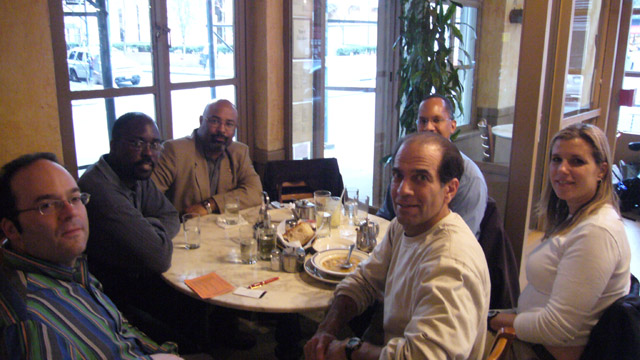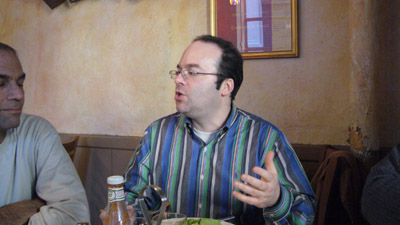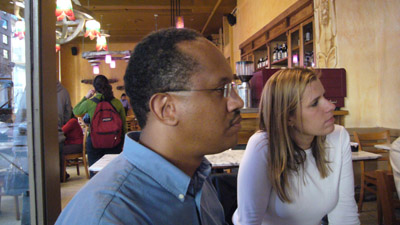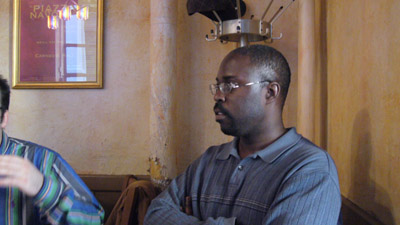|
|
By AL BERRIOS
Networking itself is as old as pre-history. That we achieve and institutionalize social connections for our benefits isn't a secret. It's the "How?" that seems to have become more interesting in the last 30 years, with a spate of books, articles, and "experts" creating an industry with it's own panoply of vocabulary to describe the dynamics of what's really occurring in networking. As more becomes known about the act, networking itself isn't merely shown to be a tool, but an environment in which nearly every human interaction gets done.
 |
| CEF participants (left to right): Jed Aber, Maximum Profit Centers; Patrick Hardy, P Hardy Technologies; Francisco Acosta of Internal Business Consulting; Derrick Rome, financial-industry consultant; Deborah Brozina, Making Change Productions; Alan Someck, Keystone Consulting. |
At our recent Consultant Entrepreneur's Forum hosted on Friday, November 10, 2006, we explored networking in response to how a consultant, or any service professional, can exploit the service economy. The response was something that tickled this economist: the service economy has already transitioned into the "networking economy", a possibility that's both attractive, yet not entirely accurate. Let me explain.
What's Really Happening In Networking
The casual observer may readily accept this notion of a "networking economy" as fact, seeing as how everywhere he turns, "social networking" and the vast sums of money propelling it forward (online) seem to encapsulate the future direction of commerce. However, as demonstrated successfully by other researchers, most notably, Pamela Walker Laird in her book "Pull: Networking and Success since Benjamin Franklin" (Harvard University Press, 2006), networking has been the only way anyone great or otherwise has ever achieved anything, great or otherwise. Thus, we have always been in a "networking economy", a sort of underlying layer, really, of the economic forms in which we create goods and services (agricultural, industrial, and information).
In my limited, although
fairly broad networking experience (I am, after all, first and foremost,
a salesman), I've observed absolutely rabid faith in networking time and
again, but never has anyone attempted to explain to me, based on a personal
analysis, or even reflection of their own networking experience, why or
how networking works for them. (Everyone, without exception, has an anecdote,
which when stretched, presents ample evidence for them of its value). Consequently,
I cringe at the presentation of any "experienced" networker as
an expert on the subject who fails to contribute anything other than jolly
anecdotes (delivered poorly, I may add) to substantiate their claim as an
expert, anecdotes that point to some vague benefits that they fruitlessly
attempt to identify as a pattern which they themselves haven't grasped,
yet they attempt to convince me of. (In response to this sort of expert,
we published our own series of reports analyzing the networking function
in professional business groups (![]() 1)).
More absurd is how these experts charge to spew forth their limited insight,
without having developed a (or at least learned another's) framework for
successful networking that anyone can use.
1)).
More absurd is how these experts charge to spew forth their limited insight,
without having developed a (or at least learned another's) framework for
successful networking that anyone can use.
Networking, as we all know but have not stopped to define, is much more than a mere "referral". An expansive term, it is actually a social screening mechanism that purposefully limits the things that impact and influence us. It further assures that whatever does get through our screen will be worth our time. As such, networking creates an environment of our own creation in which we have the luxury to explore an unlimited number of choices and lifestyles in relative security.
Social Screening
 |
|
"No!
No! No!"
|
Social screening sounds like a very exclusive and distasteful thing in our politically correct society, but rest assured, regardless of how open your mind is, you're as prejudiced as the next human, whether against another human's skin color, political inclination, faith, socio-economic standing, cultural mannerisms, sexual orientation, or just general fashion sense. You may disagree, but that's just because your maximum prejudice level hasn't been reached; as you get older, your tolerance for things that irk you, irk you because you've learned more about what you prefer and don't prefer, begins to diminish to the point where every young person is a pedophile-loving, liberal hippie and too much diversity isn't so good after all. (Even now, if this writing is offending you, you've developed a prejudice against your perception of narrow-mindedness, without letting this train of thinking to be fully elaborated.)
Because "brands
are the refuge of the ignorant" (![]() 2),
your most convenient impulse is to default to the things you know are guaranteed
to be most tolerable to you. (Of course this doesn't imply that you're ignorant,
just pressed for time. It takes willpower to try something new and willpower
takes time and energy, which you're sometimes less inclined to commit for
whatever reason.) This default impulse is most commonly referred to trust
and trust comes in three flavors:
2),
your most convenient impulse is to default to the things you know are guaranteed
to be most tolerable to you. (Of course this doesn't imply that you're ignorant,
just pressed for time. It takes willpower to try something new and willpower
takes time and energy, which you're sometimes less inclined to commit for
whatever reason.) This default impulse is most commonly referred to trust
and trust comes in three flavors:
a) The trust you liberally toss around to anything that comes in contact with you more than once (i.e. anytime you register online to some new site using the same username and password or accepting a referral to watch a new movie);
b) The trust you offer only those things that have created rules you abide by (i.e. your employer, the IRS, your bank, your landlord, your doctor);
c) The trust you offer exclusively to those things you depend on (i.e. your parents, your spouse, anyone unfortunate enough to know about your bodily odors).
There is a handicap in human society that prevents it from keeping their doors to their apartments open at night; that disinclines a friendly gesture of helping a stranded driver with his flat tire; or of leaving your child in the company of a stranger. The handicap may be instantly recognizable as the unpredictable behavior of others, requiring a more guarded approach in interacting with them. But it takes two to tango. The handicap is really a lack of trust, and your author was recently demonstrated how this handicap wasn't just a form of healthy paranoia against malintended things or people, but a handicap that utterly prevented him from interacting effectively with everyone altogether.
In Technology We Trust
The lack of trust had actually been addressed unintentionally by your author by the delegation of lower-than-average expectations amongst a group instead of an individual. Consequently, if a trusted person or two within a group failed to deliver, there would still be the statistical likelihood that at least 1 person would still deliver. And if all three failed, the consequences of that failure were minimal since the expectation was hedged by being low to begin with.
The consequences aren't easily perceived, but imagine a world where a monster wave of water wipes out an entire city and neighboring cities let the harmed citizens of that city drown, starve, and die; imagine a world where thousands of societies live in a state of perpetual hunger and disease despite their neighbors living in sumptuous comfort, with a mental reference of their worse-off neighbors as vermin and undesirables. Now, imagine the tables are turned, as they inevitably turn; would the former have-nots help the current have-nots survive given their prior treatment? This is the consequence of not being able to depend on another human being and we'll see in a moment why it is important to distinguish between layers of trust in networking.
One of the primary reasons networking, both social and business, has taken such a center stage has been because of the emergence of technology that facilitates networking. Notwithstanding all of the coolness behind having friends all over the world without ever having actually been to any of their countries, the implications of technology-aided networking have yet to be recognized for what they let networkers do: networking technology will permit people to collect and transport "networks" from their various experiences with employers, faiths, educations, and neighborhoods in the same manner that they build and move their 401(k)s around.
Networks, thanks to technology, are now mobile. And thanks to this mobility, networks continuously evolve as new pieces are added, (a virtual guarantee, since the change of mobility further prevents the enthusiasm-fatigue commonly occurring when an activity reaches a certain monotony for the person engaged in it). And with this evolution, networks also increase in value. (In other words, time isn't the only way to increase its value, as we are lead to believe by the exhortations of the anti-"mile-wide-inch-deep" gang.)
With all of the choices a mobile network presents a person, it should be of no surprise social phenomenons such as quarter-life and mid-life crises occur. What may be startling to learn is that as a direct result of mobile networks, the optimal solution to indecisiveness among various age groups in modern society (or perhaps "crises" and "indecisiveness" may simply be how we classify what may already be happening to these groups during these points in their lives) may be to forgo planning lifestyles around specific activities that have to get done by specific times, and instead planning lifestyles around the choices networks present.
Networking is the Life
 |
|
"Why
not?!"
|
What's revolutionary
about this perspective is that it provides a possible explanation as to
why certain people do what they do and appear to the observer to be wasting
time. These people may already be framing their lives not around the activity
that has to get done, but instead the direction their network takes them.
A perfect example is "Mr. Franklin" (![]() 3).
Mr. Franklin is the sort that readily, almost haphazardly, makes commitments
with genuine sincerity and enthusiasm, but typically fails to fulfill his
commitments as a direct result of overlapping commitments. (You know the
sort very well, don't you?)
3).
Mr. Franklin is the sort that readily, almost haphazardly, makes commitments
with genuine sincerity and enthusiasm, but typically fails to fulfill his
commitments as a direct result of overlapping commitments. (You know the
sort very well, don't you?)
Poor planning and unreliability are the classic culprits from the "activity/time-based (ATB) lifestyle" perspective. But when examined from the "network/activity-based (NAB) lifestyle" perspective, we can see clearly that Mr. Franklin is just an overly friendly bloke, with no concept of the term, "No!" in his vocabulary, and with close acquaintances at work, at play, and of course, a home life all angling for his time. At any given time, he has no idea where life may take him outside his regular work/home commitments, and if one is fortunate enough to catch him at this point, he'll commit to something without hesitation. On his way to that commitment, if another should be so lucky to catch him then, he will commit to that engagement, too, honestly believing he'll get everything done during the short hours of the day. Some simple planning would give Mr. Franklin greater visibility into the details of his commitments, including preparation, time to commute, and of course, time to engage. But inevitably, someone will get disappointed by Mr. Franklin's NAB approach to making plans.
Obviously, people have found ATB lifestyles are the easiest way to interact with everyone. It's even been labeled a more "reliable" way of living. NAB lifestyle may not make you reliable, but it may be the only way some of us achieve our potential. As you'd expect, everyone has a balance of both, but what happens when they are too much of one or the other. Or worse, neither? If no NAB lifestyle is present, the person may have the personality of a robot. If no ATB lifestyle is present, the person is too unreliable to function, (and usually too nice to hate him for it).
And if neither lifestyle is present? We'll explore this below.
Distinguishing Between Layers of Trust in Networking to Facilitate Identifying Opportunities
Because there are different layers of trust, we (ideally) have different networks. In a less clinically adhered manifestation than the one presented above about delegating lower-expectations to various groups rather than high-expectations to individuals, should one of your networks become inactive, non-responsive, or just plain blocked to you, it's up to you to recognize this and
a) Build a new network;
b) Co-opt someone else's network;
c) Segment or repurpose your other networks so new options are presented;
or
d) Merely allow inertia to do its job, as your network builds its momentum
and opportunities without any input from, or consideration for, you.
Understanding different types of trust and how a potential networker allots trust to the various groups of people and things he interacts with is just the start of networking. Before labeling the people around you a network, you need to give your network a purpose for being. What precisely do you, as the owner of a network, wish to derive from it? Is it a job or career, a significant other or family, a bowling buddy or even a drinking buddy? Whatever it's purpose, you can rest assured that without it, your network is nothing more than a bunch of numbers laying around unorganized on scraps of paper.
And herein lies the true secret to networking and the power that can be unleashed when exploited effectively to achieve a goal: the ability to monitor and track what activities are simultaneously occurring within all your networks and then identify a pattern of activity to a single point or moment in time (called opportunity) which you can personally intersect with to achieve something, preferably your goal.
How many countless people you know lack this ability (in this context, it sounds like a superpower, but recall, thanks to technology, entirely within the realm of the average Joe), to identify an opportunity, a beneficial pattern of activity within their own social networks; or lack the ability to even make a decision on what course of action to take once that opportunity has been identified; or worse, lack the ability to actually take action? How many countless people you know feel as though they've wasted their lives after recognizing that they've been this powerless throughout their lives? It's a complex and daunting issue for anyone to cope with and now we can understand better a person without either NAB or ATB lifestyles.
Get a Life!
 |
|
"I
disagree!"
|
Since we are all social creatures, it may be difficult to accept that not everyone has a network (not even one?) In fact, everyone does have one; but not everyone is the hub in the center of their network. Some people are permanently relegated to functioning as a sort of spoke. And, often, they're the loose or bent spoke, too. Case in point, "Geraldine Plunk".
Ever meet a person whose life seems to revolve around another person? Who seems to have no character, no personality, no actual friends except the ones she co-opted from someone else's network? This is Geraldine Plunk. Ms. Plunk has no ability to socialize, apparently never having been taught or never having learned to cultivate her own network. Her definition of "friend" is terribly shallow and she is often thought of as a "waste of space". This is a person that exhibits neither lifestyles; is it someone you enjoy spending time with?
The proverbial "old boys network" in American society has always been a point of conflict for anyone not regarded as an "old boy", namely women and non-Caucasian males. It is as though white males were the only ones taught how to network, and now that women and non-Caucasian males know about it, they fret that they're not taught the mysteries of old boy networking and are relegated to a sub-standard and unfair existence.
The reality is that networks exist to screen and ultimately exclude anyone or anything dissimilar to the network. In effect, what this means is that it's up to women and non-Caucasian males to form their own networking environments and processes and procedures for networking effectively within it, (with "effective" being defined by the individual).
Regrettably, since the only examples of networking that women and non-Caucasian males have is the old boy system, they attempt to co-opt this approach, never having scrutinized it enough to conclude that perhaps the old-boy system may not work for them. What's worse, they execute it incorrectly, leading to a perpetually poorer networking experience down the chain. The "chain" referring to the mentor/mentee or sponsor/sponsoree relationship that must exist in order for a network to exist. Women and non-Caucasian males' neglect of this critical component of the networking process has single-handedly harmed the successful development of a proprietary networking framework for women and non-Caucasian males, skewing their ability to balance their own ATB and NAB lifestyles to reach their maximum potential.
With Regards to Consulting
From the perspective of the founder of a consulting firm, the purpose of a network (that would be you) is to facilitate altering your perspective in how you perceive and develop all strategy. In order to achieve this audacious goal, opportunities that hitherto made no sense suddenly do. Opportunities like contributing articles for free, extensive use of billable time to consult entrepreneurs pro-bono, organization of free events in order to disseminate ideas, and simultaneous spreading of consultative energies across entire swaths of the commercial and functional spectrum are all opportunities identified within this entrepreneur's network. The network thus supports marketing of not just the brand of consulting, but the ideas from which selling the brand becomes much easier. And utilizing this foundation, the gnawing question of consultant qualifications and knowledge credibility is made mute, since they've already been defined by the entrepreneur via the network.
To use the structure of the layers of trust described above, this consultant is a) creating a ladder of trust by first getting you to casually commit to a single, hopefully worthwhile interaction, b) then establishing rules you agree with and abide by, and c) ultimately getting you to depend on the brand for insights you need into strategy, the need created by the rules you previously agreed with. The "old-boy" system of referrals from other "trusted" sources, endorsed by countless networking experts like our distinguished speaker above, and miserably co-opted by his fellow non-Caucasians, is consequently bypassed in favor of this alternative approach. Although this obviously takes an inordinate amount of time, it's a lifestyle of his own creation, which serves to differentiate this consultant in an industry that ostensibly lacks obstacles to entry, especially considering his relatively judicious long-range planning. (Wink wink; nod nod).
Footnotes
(1) Professional Networking Series
(2) Quotes
(3) All names appearing
in parentheses are made up.
Al Berrios is Managing Director of al berrios & co., a pure strategy consulting firm, specializing in advising organizations + entrepreneurs on managing their enterprises in a service economy. Write or Subscribe to Consumer Strategies Report.
|
|